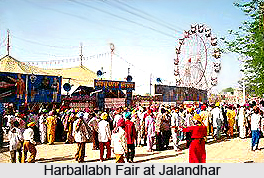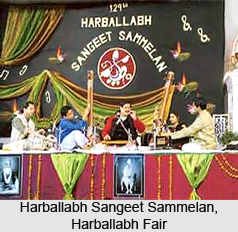 Harballabh Fair, or the Shree Baba Harballabh Sangeet Sammelan is a three-day fair which is conducted from 27th to 30th December, annually, in the honour of the Indian saint named Swami Harballabh, a talented Indian musician. A beautiful musical evening or `soiree` is organised in Harballabh Fair held in Jalandhar, Punjab, which includes active participation of some of the most skilful Indian classical maestros. The regional inhabitants of Jalandhar city are present in this grand occasion which is also attended by ardent music lovers belonging to the neighbouring cities and areas.
Harballabh Fair, or the Shree Baba Harballabh Sangeet Sammelan is a three-day fair which is conducted from 27th to 30th December, annually, in the honour of the Indian saint named Swami Harballabh, a talented Indian musician. A beautiful musical evening or `soiree` is organised in Harballabh Fair held in Jalandhar, Punjab, which includes active participation of some of the most skilful Indian classical maestros. The regional inhabitants of Jalandhar city are present in this grand occasion which is also attended by ardent music lovers belonging to the neighbouring cities and areas.
History of Harballabh Music Festival
Swami Harballabh belongs to Bajwara village in Hoshiarpur, who renounced worldly pleasures in order to become a devotee of Swami Tulja Gir, another saint. Tulja Gir was the one who had influenced him to become involved with music, and due to his mentor`s efforts, he gradually became passionate about Indian classical music. Swami Harballabh`s specialization was in the field of `dhrupadhs` which are a representation of the vocal classical Indian music, sung in the appreciation of God. Apart from that, he was also a famous music composer. The Harballabh Fair was initially started in the year 1875 at Sidh Peeth Shri Devi Talab Mandir, being initiated by Pandit Tolo Ram, who was a disciple of the saint. During 1956, the Sangeet Academy operated under the patronage of Harballabh Sangeet Mahasabha.  Devotees also pay visit to the shrine of Swami Harballabh and the Devi Talab, the sacred tank located close to the holy shrine. Free accommodation and facilities for food are provided to the pilgrims who are present at the fair. Talented singers and musicians hailing from India and also Pakistan have delivered their live performances at this music festival and fair.
Devotees also pay visit to the shrine of Swami Harballabh and the Devi Talab, the sacred tank located close to the holy shrine. Free accommodation and facilities for food are provided to the pilgrims who are present at the fair. Talented singers and musicians hailing from India and also Pakistan have delivered their live performances at this music festival and fair.
Shree Baba Harballabh Sangeet Pratiyogita
An open contest in the sphere of Hindustani Classical Music is hosted by the Mahasabha every year for a period of three days, prior to the annual Sangeet Sammelan, in order to motivate the youngsters to excel in Hindustani classical music. Percussion Instrument, Non Percussion Instrument and Vocal Instrument are the three basic categories which consist of two age groups of Juniors or `Yuva Varg` (between 13 to 19 years), Seniors or `Varishth Varg` (19 to 25 years). Awards are offered to the winners in three categories: First, Second and Third. The winners belonging to the Senior age group are given a golden opportunity to perform as `Performing Artist` in the very next Sammelan.
During February, August and October, Malhar Utsav, Vasant Utsav and Hemant Utsav are held, every year. Upcoming artists are invited to deliver their performances, in the sphere of Hindustani Classical music.




















